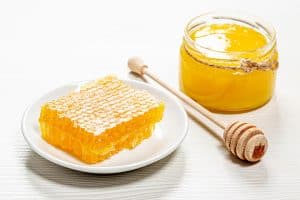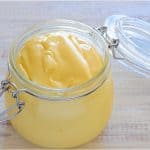Honey, the golden syrup that holds a coveted place in every traditional kitchen is a safe choice even during pregnancy. In fact, thanks to its antibacterial and antioxidant properties, it can be a boon. It fortifies your immune system, helps you fight minor coughs and colds, soothes a sore throat, heals stomach ulcers and topical cuts, wounds and minor burns and even provides relief from insomnia.
But, just like table sugar, honey is high in glucose as well as fructose and maltose. Just one tablespoon of honey consists of 60 calories as compared to 48 calories in one tablespoon of sugar. So while it may taste sweeter and boast of healing properties, stick to a maximum of 4 tablespoons a day. Because the CDC and the FDA recommend that only 10% of calories should come from consuming simple sugars each day.
If you have gestational diabetes or suffer from type II diabetes or insulin resistance, consult your doctor before consuming honey.
Honey poses the risk of botulism in infants less than one year old as their digestive and immune systems are not yet fully mature to combat the clostridium bacteria. But healthy adults, including healthy pregnant women can fight off the infection. And there is no risk of the bacteria or its toxins affecting the foetus as the placenta acts as a barrier, shielding the baby from potential infection. Just make sure you purchase pasteurised honey from a government certified and reputed brand.
But, like any good thing, consuming honey in excess can cause cramps in the stomach, irritation of the gastrointestinal tract, diarrhoea, bloating and stomach problems. Therefore, moderation is the key.
Manuka honey is a popular choice in some honey-loving circles. It is a honey made from the Manuka bush. It is believed to possess more antibacterial properties than honey obtained from other sources. But again the question arises whether Manuka honey is safe in pregnancy? No conclusive tests have been done yet to answer that question. However, the guideline to look for pasteurised honey with government certification applies here too.
Here are a few precautions to take while consuming honey:
- Adding honey to hot water or a hot beverage may result in the loss of the valuable enzymes and nutrients.
- Try not to have honey along with foods rich in Vitamin C and D as the minerals present in honey will nullify the benefits.
- Mixing honey with bean curd may cause indigestion and upset the stomach.






